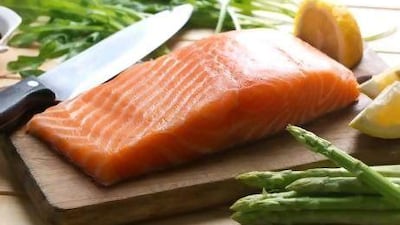It is estimated that one in six couples in the UAE have trouble conceiving - and while factors such as stress, late marriage and hormonal imbalance are thought to contribute to the problem, diet can also play a big part.
Indeed, researchers from Harvard University found that women who made dietary changes reduced their risk of infertility by as much as 80 per cent; while researchers at King Saud University College of Medicine in Saudi Arabia discovered that vitamin E dramatically improves men's fertility.
"The food choices you and your partner make can have a major effect on improving fertility," says Zita West, the author of Fertility & Conception.
For him
Do:
Make a maca smoothie. One of the hottest superfoods at the moment for men's fertility is maca, a root vegetable from Peru which has been shown to significantly improve all aspects of sperm health," explains Laura Holland, a nutritional therapist in Dubai (www.BeUtifulYou.co.uk). "You can buy maca in powdered form and mix with smoothies. It actually tastes pretty good, too."
Indulge in oysters. At least 15mg of zinc a day is thought to increase testosterone production. If you don't fancy oysters, there are plenty of alternatives: chicken, beef, crab, eggs and turkey are all good sources of zinc.
Broaden your diet. "Pumpkin seeds, pomegranate and goji berries are all rich in zinc and great for male fertility," says Holland.
Eat oily fish. Salmon, mackerel and sardines are the best source of essential fatty acids, omega-3 and omega-6 oils, all of which are vital for sperm development. They also enhance its quality and mobility.
Enjoy your leafy greens. Spinach and other leafy greens are rich in folate, which improves sperm production. A study by the University of California found men with high intakes of this nutrient had up to 30 per cent healthier sperm.
Go nuts. "Brazil nuts are particularly rich in selenium which is essential for sperm health," explains Holland.
Stock up on vitamins. Researchers at the University of Wisconsin found that consuming 1,000mg of calcium and 10mcg of vitamin D daily may improve men's fertility. Vitamin C helps to keep sperm cells from clumping together, which prevents them from moving well, and helps stop free radical damage, which affects sperm motility, the percentage of live sperm and the percentage of normal sperm cells.
Do not:
Do decaf. It is thought caffeine may increase sperm motility in men.
Eat too little. Overly strict dieting resulting in severe weight loss can reduce sperm formation in men.
Eat too much. Obesity has an adverse effect on fertility in both sexes.
Overcomplicate things: "We forget that each of our cells has the innate wisdom and ability to be in perfect health; all we need to do is provide the correct environment to allow this wisdom to work its magic," says Holland. "This means making sure that what we choose to put into our body is life-giving, natural, fresh, wholesome food."
For her
Do:
Join him for a maca smoothie. "Maca has been shown to help female fertility thanks to its balancing effect on hormones," says the nutritionist Laura Holland.
Drink eight glasses of water. Water is needed for plump egg follicles and a strong blood supply to the womb lining. If you're dehydrated, your cervical fluid (the stuff that helps the sperm find the egg) also becomes sluggish.
Make him share his oysters. At least 15mg of zinc a day is thought to increase ovulation and fertility in women. Zinc promotes proper cell division, which is critical to the earliest stages of conception.
Switch to full-fat. A study by Harvard University found women who eat at least one serving of full-fat dairy a day reduce their risk of infertility by more than a quarter. It's thought that the fat in dairy helps improve ovarian function. Consider having a glass of full-fat milk a day.
Get your protein balance right. "Proteins are life's building blocks and omega 3 is essential for hormonal balance," explains Holland. Getting enough protein is vital for egg production and it can be found in foods such as flaxseeds, nuts, quinoa, fish, eggs and chicken. Women need about 45g of protein a day – but don't have too much because it may interfere with embryo implantation.
Up your iron levels. "Iron levels need to be kept healthy to support the blood and vital energy of the body," explains Holland. "Raisins, prunes, dates, chickpeas and dark, leafy greens are particularly good sources of iron."
Buy some folic acid. In a study conducted by researchers in Budapest, Hungary, researchers found that women who took 800mcg of folic acid a day conceived more quickly than those who did not take supplements.
Get your vitamins. "B vitamins are also very important as they help keep the nervous system calm, digestion healthy and hormones balanced – whole grains, lentils, nuts and sunflower seeds are all excellent sources," says Holland.
Do not:
Have sugary coffee: Sugar and caffeine overstimulate your system and affect blood-sugar levels, which has negative effects on hormonal balance. A study conducted by the Yale University School of Medicine found that women who drink more than three cups of coffee a day risk reduced fertility.
Eat too little. Overly strict dieting that leads to severe weight loss can disrupt ovulation.
Obsess. "Eating fresh, natural foods with an abundance of variety all within a relaxed state of mind is the recipe for allowing life to grow. Micro-managing our eating creates anxiety – this isn't an environment which allows your body to feel safe and strong enough to support more life," says Holland.

